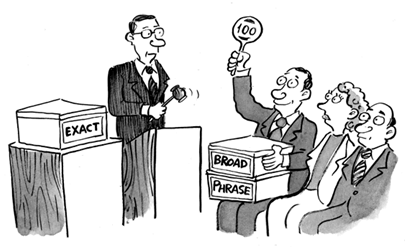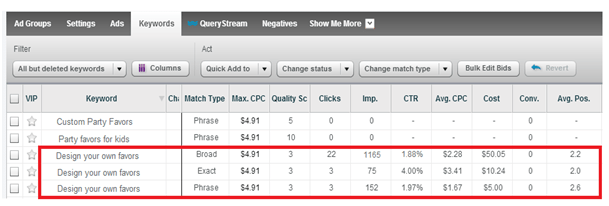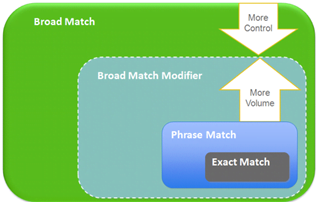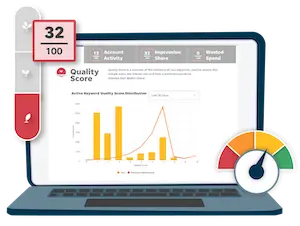Should You Include the Same Keyword with All Match Types in Google Ads?
There is an age-old argument about structuring your account based on the match type of the keywords in each ad group. Should you add all keywords on exact, phrase, and broad (and don’t forget modified broad)? What is the right way to do it? If there are so many ways to structure, how do you choose? These are all questions that, so far, I haven’t seen definitive answers to. Everyone seems to have an opinion on how to structure an account – do this, don’t do that, add this, follow this best practice, etc. But who is right?

Hard evidence seems to be lacking for one view or another, but is adding all these match types ever necessary? If you have a keyword on a broad match type, why do you need phrase and exact? Aren’t you already getting enough traffic? And this is where the problem lies; people don’t know the differences of the match types, when to use them and why. You don’t need all three match types for each keyword in an ad group if you understand the fundamentals of each match type. I find it unnecessary to add all three match types and costly if you do structure your account that way.
In 2021, Google made changes to keyword matching behavior to suggest that using multiple match types for the same keyword would no longer be necessary, and that broad match + Smart Bidding should suffice for many of your campaigns. But many advertisers disagree.
Broad match keywords can bring in a lot of unwanted traffic, and you end up spending more time adding negatives and fighting with your low CTR’s than you do working on other important parts in your account. I don’t think broad match is all doom and gloom, but I do find it to be time-consuming, and they usually end up being the underperforming keywords in your account.
One good thing about having all three match types is the ability to test each keyword match type against each other to find out which one is cheaper, has a better CTR, and drives more conversions than the others. Usually, through testing, you can find out which match types work for you and which ones don’t.

Looking at the example above, you can see that in this case, the broad match keyword “Design your own favors” has the highest number of impressions, lowest CTR, and a pretty low cost per click. The same keyword on exact match has a high CTR, low impressions and a more expensive CPC. Then the phrase match version has a low CTR, decent amount of impressions and the lowest CPC.
This would be a case of what I mentioned earlier, where the broad match keyword now becomes one of your more time-consuming tasks to manage. It seems to be doing satisfactory but it is also the most costly keyword in the group. My suggestion, in this case, would be to stick with the exact match keyword. While it is a bit more expensive per click, you know that the searchers are looking for your keyword exactly. You should be willing to pay slightly more for those search queries that are the most relevant because the searcher is more likely to convert to a customer. Also, the exact matched keyword has the best average position and overall seems to be the best match type based on the historical data.

Knowing the different match types is vital to figuring out which ones to use in your account. As a rule of thumb, broad tends to be more expansive, phrase is great for those keywords that only make sense in that exact order or phrasing (typically branded terms), and exact is great for those competitive terms that may be a bit more costly but you know you always want to show up for, or those terms that don’t make sense in any other order. Everyone has a match type they like to stick with but knowing which works best for your business is the best and most efficient way of saving time and money. Testing your keywords on all three match types is always an option, but it is time-consuming, can be costly and may not be worth it for those who have a limited budget. If you can accomplish your business goals using an exact match keyword, then why add it on phrase and broad as well?
There are many ways to structure your account and everyone does it differently. Some think that adding all three match types will bring in traffic and clicks which will lead to conversions. Others think that having all three in an ad group will capture all audiences out there which they think is the best approach. Personally, I’d rather have less traffic if I know I’m bringing in the right traffic. However, everyone has an opinion on this topic and I would love to hear yours! If you feel differently or would like to weigh in, let me know by commenting below.
(Read More on the Debate: Google Ads Mirrored Campaigns)









Comments
Please read our Comment Policy before commenting.